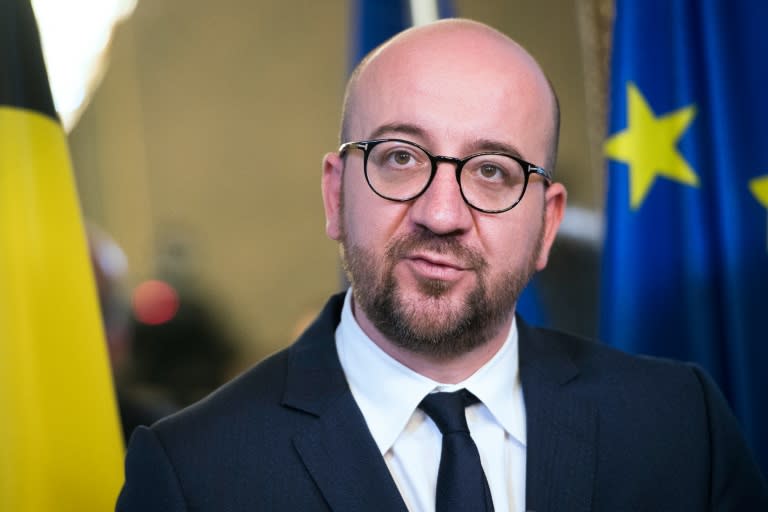EU eyes Canada trade deal breakthrough, Ottawa cautious
Belgium announced a breakthrough Thursday to save a landmark EU-Canada free trade deal, winning over domestic holdouts who threatened to torpedo the agreement and further damage Europe's international credibility. But news of the intra-Belgian agreement came too late for EU leaders and Canadian Prime Minister Justin Trudeau to sign as planned -- while Canada's Trade Minister Chrystia Freeland cautioned there was more work ahead. "There is still work to do. Additional steps remain before signing," she said in Ottawa, adding: "Canada remains ready to sign this important agreement when Europe is ready." The deal was originally supposed to have been signed in Brussels on Thursday, but talks last week failed to persuade Belgium's fractious French-speaking communities to back the agreement. Talks continued nonetheless this week, and finally bore fruit Thursday. "This is an important agreement that is on the table," Prime Minister Charles Michel told a press conference after marathon talks to win over Belgium's francophone Wallonia region. Under complex constitutional arrangements, Michel needed all of Belgium's regional governments to back the deal before he could sign up. The holdout regions had effectively blocked the accord -- which requires the approval of all 28 EU members -- raising fears that seven years of trade negotiations were to go to waste. Confirmation of the agreement came swiftly from Paul Magnette, head of the southern French-speaking Wallonia region, who has led objections to the Comprehensive Economic Trade Agreement (CETA). - EU's reputation at stake - The stakes have been high as Belgium had become a lighting rod for warnings that the EU's international standing, already battered by Britain's shock June Brexit vote, would suffer further if the huge, long-planned deal with Canada got scuppered. Hinging on CETA's outcome are complex EU trade negotiations with other countries, including an even bigger and more controversial deal with the United States. Canada's Foreign Minister Stephane Dion hailed the move to break the logjam. "If it materialises, it's excellent news," he said during a visit to Paris, adding he was "cautiously optimistic". Donald Tusk, president of the European Council, hailed the "good news", while French Prime Minister Manuel Valls hailed it as a "decisive step" that would allow Europe to sign the "win-win deal" as quickly as possible. The accord must be vetted by the remaining 27 EU member states and institutions, as well as by Wallonia and other regional governments which, Michel said, have pledged to give their answer before midnight (2200 GMT) Friday. EU ambassadors reached an informal agreement on the Belgian documents and have asked their capitals to confirm by midnight Friday, according to Belgian, French and Luxembourg officials. But a European source told AFP there was no new date set yet for the deal itself to be signed. A European source told AFP on condition of anonymity that the summit deadline had been more a "tool" to apply pressure for an agreement than a must-have event. Around 100 demonstrators banging pots protested on Thursday outside the headquarters of the European Commission, the EU executive. Similar protests are held regularly by opponents of the EU-US talks known as TTIP. - 'Extremely happy' - The CETA pact would link the EU's single market of 500 million people -- the world's biggest -- with Canada's 10th largest global economy in what would be the most ambitious tie-up of its kind. In almost a week of drawn-out talks, leaders of Wallonia, a 3.5 million-strong region south of Brussels, had demanded guarantees that CETA would not harm local farming and other interests. Magnette particularly opposed terms of the deal intended to protect international investors which critics say could force governments to change laws against the wishes of the people. With the remaining political hurdles hopefully cleared, Tusk may be free to phone Trudeau on Saturday to discuss the next steps, including possibly a signing ceremony, an EU source told AFP. Once the treaty is signed, it will be applied provisionally pending ratification by all EU member state parliaments, a process that could take years. The Canadian trade minister downplayed Thursday a provision that would allow Wallonia to still back out of the deal during an interim period. "Let me say one thing on the escape clause -- every trade agreement, including as Britain has demonstrated (by voting to withdraw its) membership in the EU, has exit provisions," said Freeland. "Trade agreements must be structured that way to permit national sovereignty, and that is also the case with CETA," she said.



